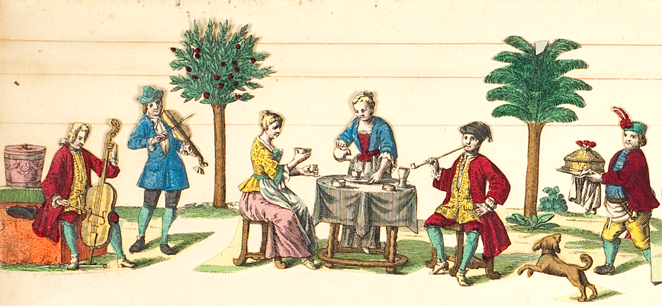Collection context
Summary
- Creator:
- Mackenzie, Compton, 1883-1972
- Abstract:
- The Mackenzie mss., 1912-1970, consists of the correspondence, essays, and photographs of author Sir Compton Mackenzie, 1883-1972.
- Extent:
- 1 Box (1 standard)
- Language:
- Materials are in English .
- Preferred citation:
[Item], Mackenzie mss., Lilly Library, Indiana University, Bloomington, Indiana.
Background
- Biographical / Historical:
Sir Compton Mackenzie, 1883-1972, was a writer, Scottish nationalist, and cultural commentator. He was born Edward Montague Compton Mackenzie on January 17, 1883 in West Hartlepool, County Durham, England. He attended St. Paul's School in London and Magdalen College, Oxford, where he graduated with a degree in modern history. One of his first early successes was his novel Carnival (1912), which was later adapted into a film three times as The Ballet Girl (1916), Dance Pretty Lady (1932) and Carnival (1946). His coming of age novel Satire Street (1913-1914) was known for its influence on other authors, such as George Orwell, who read it as children. From 1913 to 1920, Mackenzie and his wife Faith Compton Mackenzie lived on the island of Capri, where he befriended William Somerset Maugham and converted to Catholicism in 1914. As a result of his experiences on Capri, Mackenzie published a trilogy of books with religious themes and two novels, Vestal Fire (1927) and Extraordinary Women (1928), based on the lives of the islanders, many of whom were homosexual.
After 1928, Mackenzie moved to Scotland where he co-founded the Scottish National Party and supported Scottish nationalism. He would go on to set two of his novels in Scotland: Monarch of the Glen (1941) and Whisky Galore (1947). Throughout the 1930s he held several positions, including rector of Glasgow University (1931–34), literary critic for the London Daily Mail (1931–35), and founder and editor of Gramophone magazine (1923–62). His two most notable, and controversial works, were also published in the 1930s. Mackenzie wrote the autobiographical Greek Memories (1932) based on his experiences working for British Intelligence during World War I. The British secret service later prosecuted him under the Official Secrets Act, claiming that he revealed secret information in the book. Mackenzie responded by attacking the secret service in his satirical Water on the Brain (1933).
Over the course of his career, Mackenzie published over a hundred books of different genres and subjects, including fiction, history, biography, literary criticism, satire, children's stories, and poetry. One of his last works was his autobiography, My Life and Times, published in ten volumes from 1963–1971. He was knighted in 1952 and died on November 30, 1972 in Edinburgh, Scotland.
- Scope and Content:
The correspondence includes Mackenzie's letters to and from poets, novelists, publishers, and journalists. They deal primarily with literary figures and requests for articles on particular subjects. Many of the sixty letters to Martin Secker, 1882-1978, publisher, are of a personal nature. Included is also the agreement with James Brand Pinker appointing him as Mackenzie's literary agent accompanied by a letter of March 25, 1912, in which Pinker expresses the hope that this may be "the beginning of a long and prosperous alliance."
Correspondents represented include: Sir Arthur Beverley Baxter, Francis Victor Blackwell, George Blake, Mrs. Elsie Thornton Cook, Caradoc Evans, Faith (Stone) Lady Mackenzie, Lilian (MacSween) Lady Mackenzie, James Milne, Thomas Power O'Connor, James Brand Pinker, Herbert Greenhough Smith, Sewell Stokes, George Malcolm Thomson, Frank Whitaker, Wilfrid Whitten, Pearkes Withers, Barbara Frances (Adam) Wootton, and Baroness Wootton.
The collection also includes "The Grindstone," the opening chapter of a novel never completed, 1914; a collection of photographs; and a few printed items. Among the photographs are two of his wife, Faith (Stone) Lady Mackenzie; four of Mrs. Christine (Humphreys) Mavrogordato (Mrs. John Mavrogordato); and fifteen of Sir Compton Mackenzie from his childhood through his Oxford period, World War I, and Capri.
Note on Indexing Term - "Radio": Of interest is a Jan. 12, 1929 radio play entitled "Radio Drama" and a 1949 application for election to membership to the Radiowriters Association, London.
- Acquisition information:
- Purchase: 1973
- Arrangement:
This collection is arranged following original order.
- Physical location:
- Lilly - Stacks
Indexed Terms
- Subjects:
- English Poetry
Radio
Literary agents
Authors, Scottish - Names:
- Mackenzie, Compton, 1883-1972
- Places:
- Capri Island (Italy)
Access
- RESTRICTIONS:
-
This collection is open for research.
Many collections are housed offsite; retrieval requires advance notice. Please make an appointment a minimum of one week in advance of your visit.
- TERMS OF ACCESS:
-
Photography and digitization may be restricted for some collections. Copyright restrictions may apply. Before publishing, researchers are responsible for securing permission from all applicable rights holders, then filling out the Permission to Publish form.
- PREFERRED CITATION:
-
[Item], Mackenzie mss., Lilly Library, Indiana University, Bloomington, Indiana.
- CAMPUS:
- Indiana University Bloomington
- LOCATION OF THIS COLLECTION:
-
1200 East Seventh StreetBloomington, Indiana 47405-5500, USA
- CAMPUS:
- Indiana University Bloomington
- CONTACT:
-
(812) 855-2452liblilly@indiana.edu

